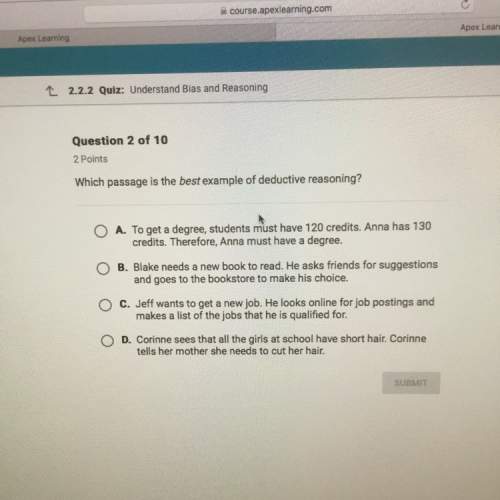From “Labour”
by Thomas Carlyle
The latest Gospel in this world is, Know thy work and d...

English, 29.10.2020 20:20 redraider4915
From “Labour”
by Thomas Carlyle
The latest Gospel in this world is, Know thy work and do it. “Know thyself”: long enough has that poor “self” of thine tormented thee; thou wilt never get to “know” it, I believe! Think it not thy business, this of knowing thyself; thou art an unknowable individual: know what thou canst work at; and work at it, like a Hercules! That will be thy better plan.
It has been written, “an endless significance lies in Work”; a man perfects himself by working. Foul jungles are cleared away, fair seedfields rise instead, and stately cities; and withal the man himself first ceases to be a jungle and foul unwholesome desert thereby. Consider how, even in the meanest sorts of Labour, the whole soul of a man is composed into a kind of real harmony, the instant he sets himself to work! Doubt, Desire, Sorrow, Remorse, Indignation, Despair itself, all these like helldogs lie beleaguering the soul of the poor dayworker, as of every man: but he bends himself with free valour against his task, and all these are stilled, all these shrink murmuring far off into their caves. The man is now a man. The blessed glow of Labour in him, is it not as purifying fire, wherein all poison is burnt up, and of sour smoke itself there is made bright blessed flame!
Destiny, on the whole, has no other way of cultivating us. A formless Chaos, once set it revolving, grows round and ever rounder; ranges itself, by mere force of gravity, into strata, spherical courses; is no longer a Chaos, but a round compacted World. What would become of the Earth, did she cease to revolve? In the poor old Earth, so long as she revolves, all inequalities, irregularities disperse themselves; all irregularities are incessantly becoming regular. Hast thou looked on the Potter’s wheel,—one of the venerablest objects; old as the Prophet Ezechiel and far older? Rude lumps of clay, how they spin themselves up, by mere quick whirling, into beautiful circular dishes. And fancy the most assiduous Potter, but without his wheel; reduced to make dishes, or rather amorphous botches, by mere kneading and baking! Even such a Potter were Destiny, with a human soul that would rest and lie at ease, that would not work and spin! Of an idle unrevolving man the kindest Destiny, like the most assiduous Potter without wheel, can bake and knead nothing other than a botch; let her spend on him what expensive colouring, what gilding and enamelling she will, he is but a botch. Not a dish; no, a bulging, kneaded, crooked, shambling, squint-cornered, amorphous botch,—a mere enamelled vessel of dishonour! Let the idle think of this.
Which of the following does NOT appear in this excerpt?
A.
hyperbole
B.
allusion
C.
personification
D.
extended metaphor
E.
red herring

Answers: 1


Other questions on the subject: English

English, 22.06.2019 03:20, lyndamahe0
Simple movements prove to be very significant and saves the rest of the day of the poet from being wasted. explain on the basis of the poem dust of snow class 10 dust of snow english
Answers: 1


English, 22.06.2019 06:40, autumnlyons69
Activity construct an argument about a topic, theme, or idea that you read about in william shakespeare's romeo and juliet, act ii or act iii. make sure you create a central claim for your argument that is debatable. provide textual evidence from the play to support your argument. here are some ideas for your essay. notice how each topic is focused and specific. you may write about one of these topics or choose your own focused and specific topic: discuss juliet's level of maturity and compare it to romeo's. compare how the two characters react to the events after their marriage, when romeo is banished from verona. discuss the balcony scene. does the knowledge of romeo and juliet's final fate influence the meaning of the balcony scene or the audience's interpretation of it? discuss the characters of tybalt and romeo as they relate to the theme of family and the theme of love. explain how the character of tybalt develops the theme of family and how the character of romeo develops the theme of romantic love. discuss the character of friar laurence. what motivates him to romeo and juliet to defy their parents? part a choose a topic based on what you read in act ii or act iii of romeo and juliet. then write a thesis statement. part b identify two or three short excerpts from the play as textual evidence to support your thesis statement. part c write a 300-word essay arguing the thesis of your analysis. (i mainly need on part b and c)
Answers: 1
You know the right answer?
Questions in other subjects:



History, 05.10.2020 17:01











